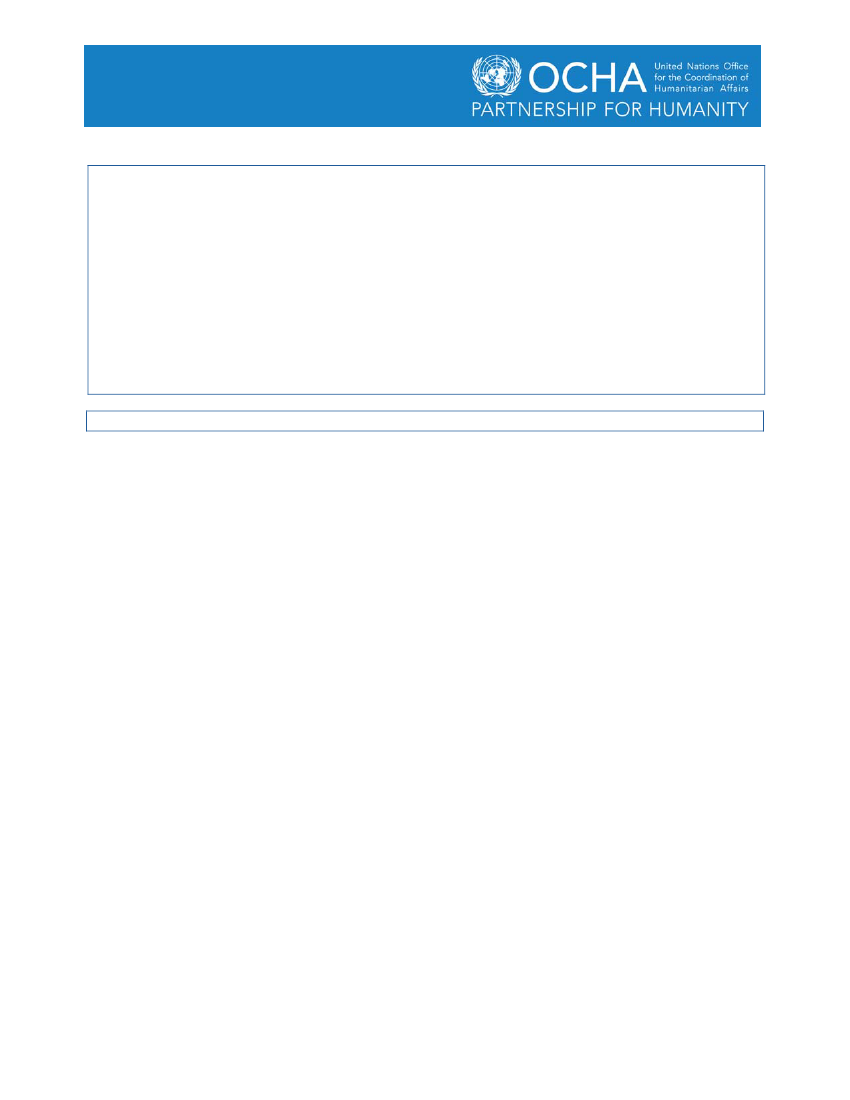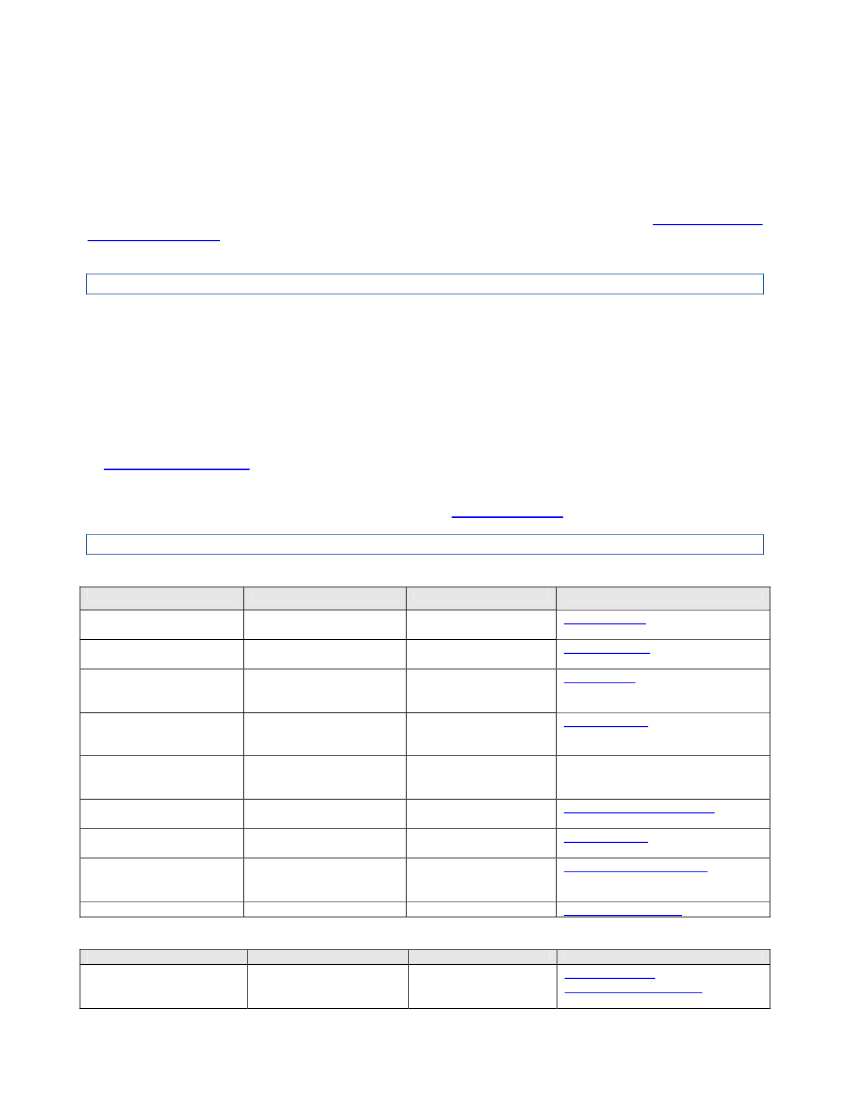Udenrigsudvalget 2009-10
URU Alm.del Bilag 105
Offentligt
Haiti•EarthquakeSituation Report #920 January 2010This report was issued by OCHA New York. The next report will be issued on or around 21 January 2010.
I. HIGHLIGHTS/KEY PRIORITIES•••••The Government estimates that 75,000 people have been killed, 200,000 injured and onemillion displaced by the earthquake that struck on 12 January.IOM estimates that some 370,000 people are living in makeshift settlements throughout thecity with limited access to water and sanitation.People continue to leave Port-au-Prince for unaffected areas in the south and south west ofthe country.A strong 6.1 magnitude aftershock struck Petit Goave on 20 January at 06:03 local time.Search and rescue teams were deployed and reported no new deaths but some injuries.Priorities for assistance remain medical assistance, food, water, shelter, as well as fuel andtransportation equipment to support the relief operation.
II. Situation OverviewAn aftershock of 6.1 magnitude on the Richer scale hit Haiti at 06:03 local time on 20 January. The epicenterof the aftershock was 5km south of the city of Petit Goave (approximately 60 km southwest of Port-au-Prince).Search and rescue and assessment teams were dispatched to Petit Goave and Leogane to evaluate damageand to resurvey buildings for potential trapped survivors from the 12 January earthquake. No new deathswere reported but there were a number of injuries. Medical teams are remaining in Petit Goave overnight toprovide assistance.USAR teams continued their activities on 20 January. It was unclear if there had been additional live rescuesat the time of reporting. Search and rescue activities will continue.The Haitian Directorate for Civil Protection (DCP) has estimated that the earthquake resulted in 75,000persons killed, 200,000 injured and one million displaced. Approximately half of all structures in Port-au-Prince are believed to have collapsed.IOM estimates that there are more than 300 makeshift settlements scattered throughout the city, with anestimated 370,000 people living under improvised shelter with no access to water supplies, according torecent assessments. Until tents can be provided, priority needs for those in these settlements include plasticsheeting, water containers, and water purification tablets.Work has started at a site recently identified in the suburb of Croix des Bouquets for a temporary settlement.A Brazilian battalion deployed with MINUSTAH is leveling the land for the establishment of a 30,000 persontented settlement which will facilitate aid delivery to a large numbers of displaced. The Inter-AmericanDevelopment Bank is planning to build permanent houses for 30,000 people at the same location.The Government’s free transport service for people wanting to leave Port-au-Prince remains active and manypeople are leaving affected areas. According to the MINUSTAH Regional Office in Les Cayes, populationsare arriving in Grande Anse, Nippes, South, and South west departments. The provision of tents to thesepopulations and the installation of more organized and structured transit centres is priority.The Prime Minister confirmed the Government’s intention of building temporary settlements. The Governmentreminded humanitarian partners of the upcoming rainy season which starts in April and expressed its wish toprovide shelter to all displaced by that date. President Préval broadcasted from radio MINUSTAH to thepeople of Port-au-Prince on 19 January sending a message of encouragement and explaining what theinternational community was doing to help Haitians.
The mission of the United Nations Office for the Coordination of Humanitarian Affairs (OCHA) is to mobilize and coordinate effective andprincipled humanitarian action in partnership with national and international actors.
The overall security situation remains stable despite isolated instances of looting and unrest. The conditionsof prison facilities and earlier prison escapes continue to be cause for concern.III. Humanitarian Needs and ResponseThe 12 clusters1designated in the Flash Appeal are mobilizing and holding more regular meetings tocoordinate their joint efforts.LogisticsThe Logistics Cluster continues to report heavy congestion at the Port-au-Prince airport. About 150 planesare landing daily. Finding free slots for large aircraft is still a challenge. The logistics cluster is requesting thatplanned flights are announced well in advance, and unless the cargo is life-saving, to use the airport in SantoDomingo which has sufficient operational capacity.Following repairs to the south pier of the port at Port-au-Prince, the first ship was able to land with 123 metrictons of goods. Many more ships are expected over the coming period. All vessels considering transit to Haitishould confirm that the facility they intend to visit can safely accommodate their arrival.The port at Gonaives is operational and has lifting capacity. Saint-Marc is also operational but has no liftingcapacity. Miragoane and Jacmel ports can accept some cargo but the road to Port-au-Prince from both portsis likely to be blocked. Cap Haitien is fully functioning, but there is limited or no fuel available at the port. Portde Paix and Labadie ports are operational with minimal to no damage.In Port-au-Prince, Atlas/Handicap International is running a fleet of 3.5 metre all-terrain trucks to provide freeinter-agency transport. The team and structure were in place before the earthquake and the operation isrunning smoothly. This capacity will be augmented with both private contracted trucks and military vehicles.All requests for transport by US military assets are being coordinated through the Logistics Cluster to ensurethe most effective use of the available resources. The Logistics Cluster is also coordinating with the Canadianmilitary, which is currently focusing mainly on the south coast out of Jacmel. Cargo movement request formsand temporary storage request forms are available on the Logistics Cluster website athttp://www.logcluster.org/ops/hti10a.A Logistics Cluster meeting is held daily at 09:30h at the humanitarian operations centre in Port-au-Prince. Afirst Logistics Cluster meeting was held in the WFP office in Santo Domingo on 19 January, with 17 agencies,NGOs and donor representatives attending.HealthThe Health Cluster reports that five hospitals have been assessed, including General Hospital, Hospital de laPaix, Isaie Jeanty, Hospital Choscal and Carrefour Diquini Hospital. The immediate priorities are to reinforcehospital staff and to tackle the medical waste problems. Assessments of hospital facilities will continue to lookat hospital infrastructure, referral systems and the organization of transportation of patients.Haiti’s Central Procurement Agency for Drugs and Medical Supplies, managed by PAHO/WHO (calledPROMESS) is procuring additional medical supplies to cope with demand, and will continue purchasing in theDominican Republic to ensure rapid distribution. Flights are en route to Haiti, carrying medicines and suppliesthat can treat 165,000 people for one month, as well as drugs and equipment to treat 1,000 people withtrauma injuries.Disease surveillance is ongoing and an early warning system is being established. Population displacementand overcrowding could increase the risk of transmission of communicable diseases. Damaged medical andsanitation systems, and a lack of safe drinking water, could lead to hygiene related and food borne diseases.Untreated trauma wounds and infection of wounds are major health concerns that need priority attention.
1
The 12 clusters are: Camp Coordination and Camp Management (IOM); Education (UNICEF); Emergency Shelter andNon-Food Items (IOM); Food (WFP); Logistics (WFP); Nutrition (UNICEF); Protection (OHCHR with UNICEF for ChildProtection and UNFPA for GBV; WASH (UNICEF); Agriculture (FAO); Early Recovery (UNDP); EmergencyTelecommunications (WFP); Health (WHO/PAHO).
The mission of the United Nations Office for the Coordination of Humanitarian Affairs (OCHA) is to mobilize and coordinate effectiveand principled humanitarian action in partnership with national and international actors.
2
The Health Cluster is working closely with the newly established National Commission for the Management ofthe Crisis, which integrates the Health Ministry, to support national priorities that include establishing mobileclinics in all the spontaneous settlements that have been created; ensuring the availability of obstetric careand delivery kits; and ensuring that the delivery of health care services is properly coordinated with thesupport of the Health Cluster.The Health Cluster sub-group on public health assessments. led by the NGO Merlin. is looking to adapt anduse the Inter-sectoral Rapid Assessment (IRA) tool to determine priority needs. The Health Cluster and otherclusters have agreed to form multi-disciplinary teams to carry out this rapid assessment. OCHA will assist withthe logistics in collaboration with the UNDAC Team.The Health Cluster is considering setting up an additional sub-group to deal with drugs and medical supplies(reception and distribution).FoodDeliveries were able to take place to almost 10,000 people in Jacmel on 19 January. The Government hasrequested that food assistance should also take into account regions not directly affected by the earthquakedue to price hikes and food shortages reported across the country. WFP estimates that up to 2 millionpersons affected by the earthquake require food assistance in Haiti, noting that an estimated 1.8 millionHaitians were food insecure prior to the earthquake.Following the one-week emergency ration, WFP plans to transition to 60 days of general food distribution,initiating food-for-work activities when possible to rehabilitate streets and public buildings. In the comingmonth, WFP also expects improved access to affected neighborhoods, increased water tankering, and theprovision of shelters and kitchen sets, to support a transition to dry rations in some neighborhoods, andcommunity kitchens in others.WASHAs of 19 January, the WASH Cluster has established 82 distribution sites for water, and has 180 water truckswith a total capacity to provide water to 180,000 people. Water tanks are been erected in each zone of thecity. Water distribution was halted on 19 January due to fuel shortage. UNICEF contracted a fuel provider on20 January that has committed to providing 5,000 gallons of fuel on a daily basis. The main cluster prioritiesinclude continued daily distribution of water to affected population and increasing the number of water trucksto facilitate distribution.The makeshift settlements in Port-au-Prince are a concern due to limited latrine capacity. The Governmenthas confirmed that stocks of 900 latrine plates are available in-country. There is also a need for constructionmaterials for latrines.The WASH cluster announced that no more water purification units are needed, but shortages persist forbladders, distribution units, small water pumps for drinking water and drums for latrines. The cluster will beginsanitation and hygiene promotion activities shortly.The WASH Cluster reports a good start in the launching of various working groups (sanitation, hygienepromotion, logistics, resource mobilization, and needs assessment) with the involvement of the private sectorand government institutions (DINEPA and SMCRS for solid waste management). Needs assessments areongoing both in Port-au-Prince and outside by cluster partners.Shelter/Non-Food Items (NFIs)IOM reports that up to 25,000 people were expected to receive non-food relief assistance on 20 January infive locations.The Shelter Cluster has developed a draft shelter strategy to address the shelter needs of the populations.Numbers for outlying regions have not been determined.UNHCR has made available 2,130 light weight tents and 18,500 plastic sheets that will arrive in Haiti on theweek of 24 January. On arrival, this shelter material will be handed over to IOM for distribution.
The mission of the United Nations Office for the Coordination of Humanitarian Affairs (OCHA) is to mobilize and coordinate effectiveand principled humanitarian action in partnership with national and international actors.
3
ProtectionThe Child Protection sub-group has established a 24-hour help line to assist with the identification and tracingof children. It has been established in partnership with the Haitian welfare ministries, with the support ofUNICEF, Save the Children and IOM.UNICEF and the Ministry of Social Work are working at the airport to block child transfers that do not have theappropriate documentation. UNICEF is coordinating with the Canadian and French embassies to support andreinforce the normal legal adoption procedures. A team will also be operational as of 21 January at the borderwith the Dominican Republic to control cross-border movements.Another priority for the sub-cluster is separated children. A list of orphanages has been compiled and thecapacities of daycare centres is being assessed. A harmonized tool for the assessment of daycare centreshas been approved by the cluster, and all data will be compiled in a database and made available to clusterpartners.UNICEF reports that it will be setting up child centres to service 900 children with tracing/reunification, food,psychosocial support and medical assistance. WFP has agreed to provide food to all child centres and childcare facilities identified by UNICEF.Due to unconfirmed reports of rape and gender based violence (GBV), UNFPA and UNICEF are working onthe rapid activation of the GBV working group.The Office of the High Commissioner for Human Rights (OHCHR) has requested UNHCR to be part of amission that will help support the coordination of the Protection Cluster in Haiti. Two UNHCR staff memberswith protection and cluster management experience are expected to arrive in Port-au-Prince shortly. They arepart of a 5-member OHCHR/UNHCR mission.NutritionThe Nutrition Cluster has been activated and will concentrate its efforts on four areas of work: infant andyoung child feeding, micronutrients (vitamin A and zinc to fight diarrhea); malnutrition and integrated rapidassessments. Supplementary feeding and therapeutic feeding will start after reception centres are set up andafter general food distribution improves.The cluster is planning a nutrition assessment to get data on the numbers of people needing treatment foracute malnutrition as well as to understand the capacity and gaps in this sector. The lack of implementingpartners is a constraint. UNICEF has deployed a Nutrition Cluster Coordinator who will be arriving in Port-au-Prince on 22 January.UNICEF/WHO/WFP issued a joint statement on 19 January calling for appropriate infant and young childfeeding in Haiti in order to promote breastfeeding and to avoid unnecessary donations of breast-milksubstitutes.AgricultureThe first meeting of the Agriculture Cluster will be held on 21 January. FAO reports that the planting season isdue to begin in two weeks’ time in Haiti. It will work with the Ministry of Agriculture in the Dominican Republicand Haiti to help with the restoration of livelihoods.Early RecoveryUNDP invited all partners to the first Early Recovery cluster meeting which will be held on 21 January. Thediscussion will focus on defining more substantially the early recovery effort to reestablish economic activitiesfollowing the earthquake.IV. CoordinationUNDAC has established a Needs Assessment Task Force to strengthen inter-cluster coordination of needsassessment in Port-au-Prince, under the leadership of the Assessment Capacities NGO consortia (ACAPS)and OCHA. All clusters have been requested to identify a needs assessment focal point. A multi-sector needsassessment is planned to take place in the coming days.The mission of the United Nations Office for the Coordination of Humanitarian Affairs (OCHA) is to mobilize and coordinate effectiveand principled humanitarian action in partnership with national and international actors.
4
To ease coordination on the ground, OCHA has requested that agencies locate their offices/bases as closeas possible to the main logbase camp in Port-au-Prince. The UNDAC team continues to coordinate the On-site Operations and Coordination Center (OSOCC) that has been established at the MINUSTAH logbase. It issupported by the European Civil Protection Mechanism and OCHA staff.UNDAC members and OCHA staff are also deployed to Santo Domingo to support coordination of relieftransiting through the Dominican Republic. A coordination and situation room has been established at the UNhouse in Santo Domingo.A Haiti coordination email listserve has been setup by OCHA/UNDAC for the distribution of locally producedcontact lists, meeting schedules and assessment reports. To join the list, e-mailhaiti.coordination-[email protected]with the subject line ‘join’.
V. FundingAccording to the Financial Tracking Service, the Flash Appeal is currently 27 percent funded. Of the $575million requested, $152 million has been received, while an additional $87 million has been pledged. Thisdoes not include contributions that have been made outside the appeal. Donors are being urged to convertpledges into cash.OCHA has received more than 80 offers of commercial services and pro-bono support from private sectorcompanies and individuals.All companies that wish to donate funds are urged to use the new UN/business partnership gateway,athttp://business.un.org.This function matches offers of support with UN needs.All humanitarian partners, including donors and recipient agencies, are encouraged to inform FTS ofcash and in-kind contributions by sending an email to:[email protected].VI. Contacts1. OCHA ContactsLocation
New YorkNew YorkGenevaRole
Desk OfficerSpokespersonSpokespersonName
Ms. Heidi KuttabMs. Stephanie BunkerMs. Elisabeth ByrsContact Details
[email protected]tel. + 1 917367 33 65[email protected]+1 917 367 5126[email protected]+41 22 917 2653, mobile +41 79473 4570[email protected]tel. + 41 22 917 1511+41229171690,mobile: +41794446025[email protected]+ 41 22 917 3514[email protected]Mobile +1646 752 3117[email protected](509) 22 44 20 50 + OCHA: ext.6289 / UNDAC team – ext: 3748[email protected]
GenevaGeneva
Humanitarian AffairsOfficerDonor Relations
Mr. Peter NeusslMs. Helena Fraser
Geneva
In-kind OffersSpokesperson
Ms. Adriana Carvalho-FriedheimMr. Nick Reader
HaitiHaiti
UNDAC
Dominican Republic
UNDAC
2. Cluster Contacts in Haiti (provided by UNDAC)Cluster
Emergency ShelterRole
Cluster CoordinatorName
Nuno NunesContact details
[email protected][email protected]Please copy to:
The mission of the United Nations Office for the Coordination of Humanitarian Affairs (OCHA) is to mobilize and coordinate effectiveand principled humanitarian action in partnership with national and international actors.
5
Food AidLogistics / UNHAS
Cluster CoordinatorCluster Coordinator
Raoul BallettoAndrew Stanhope
LogisticsEmergencyTelecommunicationsHealth
Logistics OfficerSenior EmergencyManagerCluster Coordinator
Baptiste BurgaudDane Novarlic
Dana van Alphen
WASHWASH
Cluster CoordinatorDeputy ClusterCoordinatorCluster Coordinator
Souleymane SowSilvia Gaya
Nutrition
Mija Ververs
ProtectionChild ProtectionEducationAgriculture
Cluster CoordinatorunknownunknownEmergency Coordinator
Sonia BakarJulie BergeronNieves Alvarez
Ari Toubo IBRAHIMEarly RecoveryCluster Coordinator andDeputy Director UNDPHaitiMarc-Andre Franche
Websites:Haiti coordination website:http://haiti.oneresponse.infoFor more information, please visitwww.reliefweb.intFor information on OCHA:http://ochaonline.un.org/haitiGuide to humanitarian giving for the Haiti Earthquake:http://ochaonline.un.org/donatetohaitiFor information on ICRC’s family tracing service, go tohttp://www.familylinks.icrc.org/familylinks.For the Haiti logistics cluster:http://www.logcluster.org/ops/hti10aShelter cluster:http://groups.google.com/group/shelterhaiti2010For a direct link to the Haiti Flash Appeal:http://ochadms.unog.ch/quickplace/cap/main.nsf/h_Index/Flash_2010_Haiti/$FILE/Flash_2010_Haiti_SCREEN.pdf?OpenElementICRC Q&A on the risk of dead bodies to public health:http://www.icrc.org/web/eng/siteeng0.nsf/htmlall/health-bodies-140110UNHAS flights from Santo Domingo to Port-au-Prince:http://www.logcluster.org/ops/hti10a/flash-news-17-january-2010-unhas
*****
If you would like to be added to deleted from OCHA’s global sitrep mailing list, please email[email protected]with sitrep in the subject line.The mission of the United Nations Office for the Coordination of Humanitarian Affairs (OCHA) is to mobilize and coordinate effectiveand principled humanitarian action in partnership with national and international actors.
6






